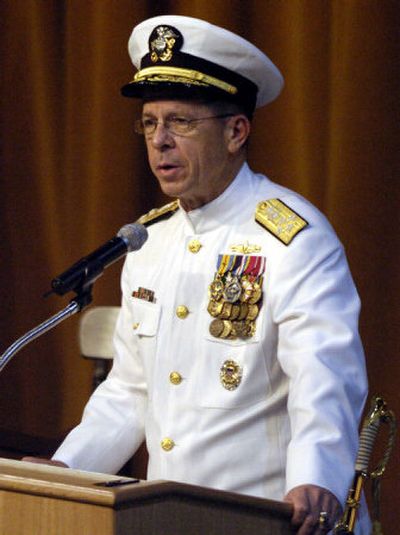Pace out as Joint Chiefs chairman

WASHINGTON – Defense Secretary Robert M. Gates has decided to replace Marine Gen. Peter Pace as the nation’s top uniformed officer, saying Friday that the military could not afford the confirmation fight Pace would face were he nominated for a second term.
Pace will be the first chairman of the Joint Chiefs of Staff not to serve a second term since the Johnson administration, and his replacement underscores the growing political crisis that has enveloped the Bush administration over its wars in Iraq and Afghanistan.
Gates announced he would recommend Adm. Mike Mullen, a Los Angeles native who runs the Navy as chief of naval operations, to become Joint Chiefs chairman when Pace’s term runs out at the end of September.
For Gates, the decision to appoint Mullen marked a major course reversal. At a Pentagon news conference, Gates said that until a few weeks ago, he had intended to renominate Pace for a second two-year term. But in speaking with Republican and Democratic senators, he was told Pace would face contentious questioning about the Bush administration’s conduct of the Iraq war.
“I just think that a divisive ordeal at this point is not in the interests of the country or of our military services,” Gates said. “I wish that were not the case. I wish it were not necessary to make a decision like this, but I think it’s a realistic appraisal of where we are.”
For Pace, the decision closes out a military career that took him from street fights in Vietnam to the inner sanctum of former Defense Secretary Donald Rumsfeld’s war-planning unit. Before becoming chairman in 2005, Pace had spent four years as the Joint Chiefs’ vice chairman and, as a result, became closely identified with Rumsfeld and the planning for the Iraq invasion.
Although mostly respected within the armed services, Pace has been criticized for not standing up more assertively to his civilian bosses during the run-up to war and in the post-invasion period.
“Pace is going to be remembered as a likable, loyal officer who carried out the wishes of an unpopular administration without challenging them, because he thought it was his responsibility,” said Loren Thompson, an analyst at the Lexington Institute, a military think tank in Virginia.
Along with Pace’s replacement, Gates also announced he would recommend Marine Gen. James E. Cartwright, the head of U.S. Strategic Command, to become vice chairman of the Joint Chiefs, replacing Adm. Edmund G. Giambastiani Jr., who announced his retirement last week. Giambastiani was also closely tied to Rumsfeld and served as the former secretary’s first senior military adviser.
White House officials traveling with Bush at the G-8 summit in Germany said Gates had informed the president a little over two weeks ago that his discussions with senators had not gone well and recommended against choosing Pace again. Gates called national security adviser Stephen J. Hadley on Thursday night to alert him of his decision, and Hadley told Bush on Friday morning, according to the White House.
Sen. Carl Levin, D-Mich., chairman of the Senate Armed Services Committee, was among the lawmakers Gates consulted. Levin said he told Gates that he and other senators likely would focus on decisions made over the past four years when questioning Pace at a confirmation hearing. Pace also was likely to face questions over his assertion in March that allowing gays into the military would be condoning behavior he considered immoral.
Republicans said that while some of the criticisms aimed at Pace might have been justified, the confirmation hearings would have descended into political theater.
“At a time when we need to figure out how to go forward, we would have been spending all of our time retrying mistakes of the past,” said North Carolina Sen. Lindsey Graham, a member of the Armed Services Committee.